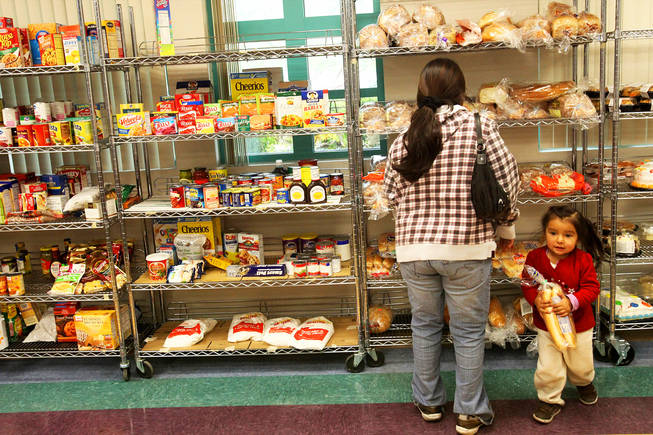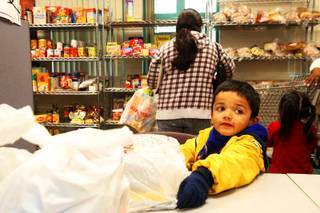
Three-year-old Kelly Cruz Garcia holds a bag of rolls as her mother, Maria Cruz Garcia, selects her food items at the Catholic Charities of Southern Nevada in North Las Vegas on Dec. 9, 2010.
Wednesday, Dec. 22, 2010 | 2 a.m.
Sun Archives
- Souped-up Three Square food bank could serve as model (8-28-2009)
- CEO of Three Square Food Bank: Nourish your spirit, Las Vegas (8-11-2009)
- Three Square opens west side collection spot (3-11-2009)
- In down economy, shelters seeing more people in need (11-26-2008)
- Six questions for Jule Murray (8-13-2008)
ABOUT THREE SQUARE
Food bank President Julie Murray started Three Square in her home in 2006. It has grown exponentially in size and reach. Backed by Feeding America — formerly America’s Second Harvest — it works with 287 agencies in four Southern Nevada counties and will provide more than 21 million pounds of food this year.
EXTRA COSTS
In addition to charging nonprofit organizations for food they provide to their clients, Three Square food bank charges “shared maintenance” and “handling” fees. Food bank leaders say that charges help cover operational costs of collecting and distributing food: transportation, utilities and staffing. Some organizations say the costs are too high.
The food pantry at Catholic Charities of Southern Nevada looks like a well-stocked employee break room. Three industrial shelving units and two family-size refrigerators line a small room filled with desks and chairs. The staples are there — cereal, cold cuts, pasta and applesauce — but in limited supplies.
By midmorning, the shelves appear picked over.
Each day, about 300 hungry people rely on the pantry. The items supplement bags of food Catholic Charities distributes twice a month — including ramen, chili, green beans, corn, tuna — but in quantities administrators admit are insufficient to sustain an average person.
“In terms of our donations, this is what we can afford,” Phillip Hollon, a Catholic Charities administrator said.
Across town, the Three Square food bank is operating something similar to grocery store warehouses. Food piles up by the truckload — spaghetti sauce, peanut butter and pancake mix, mounds of produce taller than a tour guide. Pallet trucks operated by some of its 69 employees move goods around.
A stop-and-shop convenience store, representing only a fraction of Three Square’s 120,000-square-foot campus, holds three or four times the food in Catholic Charities’ pantry.
Such is the divide in Las Vegas’ efforts to feed the hungry.
Three Square, like some big box retailer taking advantage of economies of scale and a higher profile, has made life difficult for smaller charitable operations. With the backing of Feeding America, which has monopolized 95 percent of the food bank network nationwide, the organization dominates food collection in the valley.
Working with 287 agencies in four Southern Nevada counties, Three Square will have given out more than 21 million pounds of food this year. Its board of trustees reads like a who’s who of Las Vegas elite.
To defray the costs of its operation, Three Square charges smaller charities for food to stock their shelves.
Experts say it’s a standard practice. But operators of some smaller agencies, including Catholic Charities, say they can’t afford Three Square’s prices. Compounding their problem, the bigger operation has made it more difficult for the smaller outfits to solicit food.
“Three Square does a great deal of good. We just can’t afford to pay them,” Hollon said. “We’re trying to make ends meet on our own. As a not-for-profit entity, we try to find ways to get around administrative costs.”
•••
In most cases, Three Square charges nonprofit groups a fraction of the retail price of the commodity. A 50-pound bag of flour, for example, costs $9. And many items — bread, milk, cheese and produce — are free.
But others come at a premium. For example, nonprofits are charged $51 for a case of 30 frozen beef-stew dinners. Three Square chefs produce the frozen dinners themselves, but at $1.70 each, the cost is more than off-brand TV dinners at grocery stores.
Three Square calls the charges “shared maintenance” and “handling” fees to help cover operational costs associated with collecting and distributing food: transportation, utilities and staff.
Organizations must fill out credit applications before receiving food from Three Square, and accounts more than 60 days overdue can be placed on hold.
“Some people say we’re selling product. We’re not,” Three Square Chief Operating Officer John Livingston said. “The shared maintenance fee is less than 5 percent of our operating costs.”
Three Square administrators sounded surprised that some charities complain about having to pay such fees.
“We don’t get complaints,” said Andy Schuricht, Three Square’s chief financial officer. “I’d love to find out what exactly is the issue because we need to take care of it.”
Nonprofit groups struggling with increased need in the downtrodden economy say because of the fees they are forgoing a relationship with Three Square and instead trying to procure food on their own. It’s not an easy task. Three Square partners with 154 retail stores in the valley, including Wal-Mart and all the major grocery chains.
Two years ago, Three Square had only 25 partners, all Albertsons stores.
Central Christian Church, which runs a food pantry three days a week at its Henderson site, feeding up to 1,200 people a month, gets some food from Three Square, relying on donations from its congregation to pay for it.
Pastor Bob Wood called the shared maintenance fee a burden. “It’s less expensive than going to the grocery store but still quite expensive,” Wood said. “It blows our budget.”
The church supplements its purchases and food drives with day-old bread and other items donated by grocery stores, but Wood said the supply is limited.
“A lot of it goes to the bigger charities,” he said. “We’ve tried to find other avenues.”
Church officials have begun driving to California to pick up food they can’t get in Nevada.
Three Square gets its food from local and out-of-state sources. Huge piles of potatoes and onions sitting in the warehouse last week came from California. Livingston said the agency has since summer received 5 million pounds of produce from the California Food Bank Association. Three Square pays the association shared maintenance fees for some items and provides them to charities either at or below cost.
Federal law allows Three Square, a registered 501(c)(3) nonprofit, to charge partner agencies up to 20 cents a pound in shared maintenance fees. Livingston said the agency caps fees at 9 cents a pound to make the food more affordable for nonprofit groups.
The average shared maintenance fee is a penny a pound, he said. From January through November, Three Square charged no fee for half the food it distributed.
But agencies also pay a handling fee, which varies. It’s 84 cents for four containers of frozen onion rings; $12.15 for 12 boxes of instant mashed potatoes; and $48 for 30 frozen BBQ chicken dinners.
Livingston said he bases it on his experience in the industry. The fees also are based on the price Three Square pays for items. The agency has to buy certain staples that are rarely donated — beans and rice, for example — and passes that cost on to charities.
Three Square also charges agencies an administrative fee of $150 per quarter to take part in its Fresh Rescue program, through which they receive soon-to-expire products from Albertsons.
Last year, Three Square netted about $900,000 in fees from smaller charities, a fraction of the agency’s $30 million food and operations budget.
Given the fees represent such a small portion of its budget, why charge at all?
The answer is simple economics: “It gives value to food so people don’t hoard it,” Livingston said.
Simply put, Three Square doesn’t want agencies to take more than they can use.
•••
Smaller charities rely on Three Square because of its size and influence. Many nonprofits can’t afford delivery trucks or industrial-size refrigerators.
Three Square also has massive buying power because of its local and national affiliations. The nonprofit falls under the umbrella of Feeding America, the charity formerly known as America’s Second Harvest.
Every Feeding America food bank charges shared maintenance fees to other nonprofits.
“It’s nearly universal,” said Joel Berg, a national food and hunger expert who served in the USDA during the Clinton administration. “It’s standard in the food banking industry in this country.”
Three Square paid $15,000 in dues to Feeding America last year. By all accounts, it was money well spent. The partnership allows Three Square to buy in bulk from national sources and bid on large donations. If Kraft Foods makes an error printing boxes of macaroni and cheese, for example, Three Square can bid on the crates through Feeding America and pay only shipping costs.
“Because we’re as big as we are, we can buy food for pennies on the dollar,” said Schuricht.
Feeding America’s lobbying efforts in Washington also landed Three Square $63,000 in federal grants.
But Three Square’s size and reach also mean it receives the largest share of local donations. Gifts and grants of $1 million or more are common. The agency expanded its facilities last year with a $9.4 million grant from the Donald W. Reynolds Foundation.
Under its president, Julie Murray, Three Square, which started in 2006 in Murray’s home, has grown from an $8 million startup to the massive food distribution hub it is today.
Murray took home a salary of more than $212,000 last year — a good living by Las Vegas standards but far from exorbitant in the industry. The average salary this year of a CEO of a similar-sized nonprofit was $238,000, according to GuideStar, which gathers and publicizes information about nonprofit groups.
And for those who might be concerned the nonprofit is consuming too much of its donations on overhead, Three Square spokeswoman Brittany Markarian said that 91 cents of every dollar donated goes to feed hungry people.
Charities should spend at least 75 percent of their budgets on programs and services and less than 25 percent on fundraising and administration, according to Charity Navigator, an independent evaluator of nonprofit groups. The organization suggests food banks spend even less on overhead — about 2 percent of their budget on administrative costs and only 2 cents of every dollar on fundraising.
Charles Desiderio, director of development and marketing for the Salvation Army, the valley’s largest social services agency, said his organization uses Three Square food for some of the cooked meals it serves the hungry but, because of fees, it doesn’t use its food in baskets it distributes to the hungry. Still, Desiderio said he understands why Three Square charges for its food.
“They have an overhead,” he said. “If they charge nothing, how would they pay for the trucks, employees, storage area, refrigeration? I would like to pay nothing, but common sense prevails. A minimum charge is not unwarranted.”


Join the Discussion:
Check this out for a full explanation of our conversion to the LiveFyre commenting system and instructions on how to sign up for an account.
Full comments policy